At the show grounds at Queen Sirikit National Convention Center in late November, the once exclusive LED lighting show, EcoLightTech Asia 2015 was starting to feature solar panels and air conditioning products. Many foreign buyers from Japan, Korea, Israel and Uganda showed interest in solar panels and air conditioning products.
Solar panel manufacturers, distributors and installers LEDinside spoke to at the show noted Thai government policies were driving solar market demands in the country for the last two years, and rooftop solar panel installations were trending, supported by government subsidies. Solar panel for rooftop installations were also found at PEA Encom booth.
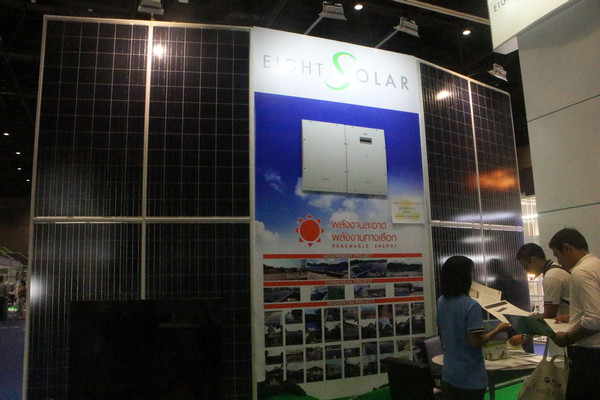 |
|
Eight Solar displaying an entire solar panel wall at EcolightTech Asia 2015. The solar industry in Thailand has grown at a rapid pace in the past years due to government subsidies. (All photos courtesy of LEDinside unless other specified) |
Thailand government policies supporting solar market developments
According to a Reuters report, the country’s solar capacity is expected to increase to 2,500-2,800 MW in 2015 from about 1,300 MW in 2014. This is about six times more than the capacity added last year. The market also remains promising as the country aims to raise its solar capacity to 6,000 MW by 2036, and has invested about $ 2.5 billion in solar energy this year.
“More clients are installing rooftop solar panels because they can make money from these installations,” said Yarisara Pulsiriwana of Enlighting, a solar panel and solar LED streetlight installer. “The payback time of their investments is usually one month.”
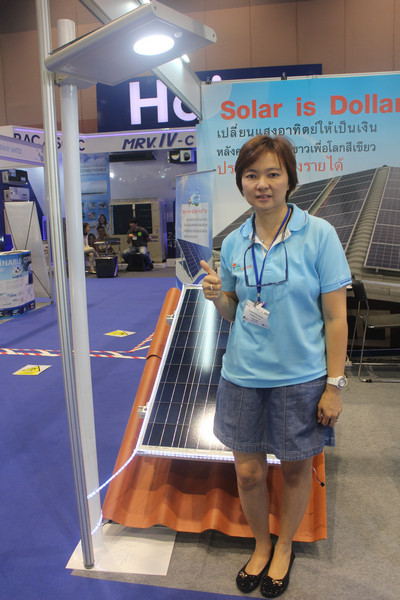 |
|
Yarisara Pulsiriwana of Enlighting standing in front of the company's solar LED streetlights and solar panels. |
Enlighting also helps its clients apply for solar project licenses, which according to Mika von Haartman, Director of Blue Connection can be very difficult to obtain and is one of the biggest entry barriers on the Thai solar market. The Thai government basically has a solar project license quota, and only approves a certain number of applications each year, explained von Haartman, who was born and raised in Thailand. Once the Thai government reaches its designated solar project quota, it can be difficult for new solar project applicants to apply, he added. The application process usually can take two to three months, said Pongsawat Wongterasoot, Senior Manager, Business, Thailand, Astronergy Solar.
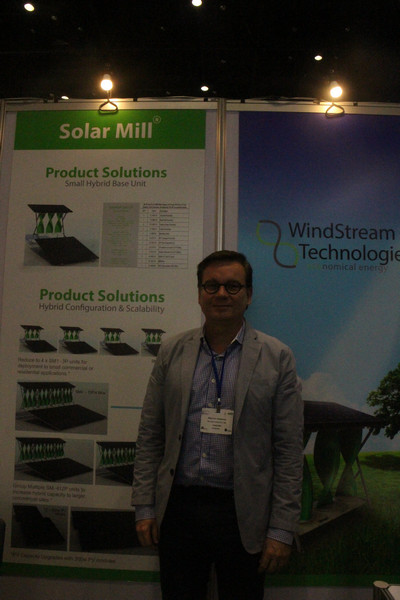 |
|
Mika von Haartman, Director of Blue Connection. |
Despite the solar project license application obstacle, many companies remained optimistic about Thailand’s solar market outlook in the next few years. Rumors in the solar industry pointed the government might be releasing licenses for 5,000 MW projects next year, said Wongterasoot. Other manufacturers interviewed including von Haartman also made similar remarks.
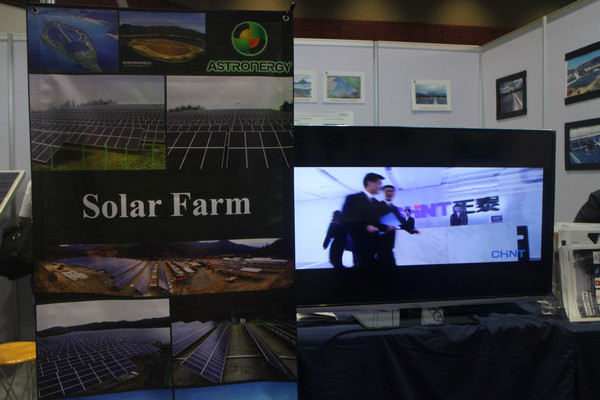 |
|
Astroenergy Solar also displayed its solar industry products. |
Astroenergy, a solar panel manufacturer under Chinese solar manufacturer Chin Group, which has been in the solar industry for over four years also shared some of their insights in the Thailand market with LEDinside. “About 80% to 90% of solar panel products on the Thai market are polycrystalline panels, and only a small group of companies are using monocrystalline solar panels,” said Pongsawat Wongterasoot, Senior Manager, Business, Thailand, Astronergy Solar.
Solar panel free on board (FOB) prices on the market can range from US $50 to 55 per watt, and about US $60 per watt for the general market, said Wongterasoot. For the Chinese solar panel manufacturer, most of its products are being imported from China, while only small volume solar modules are manufactured in Thailand.
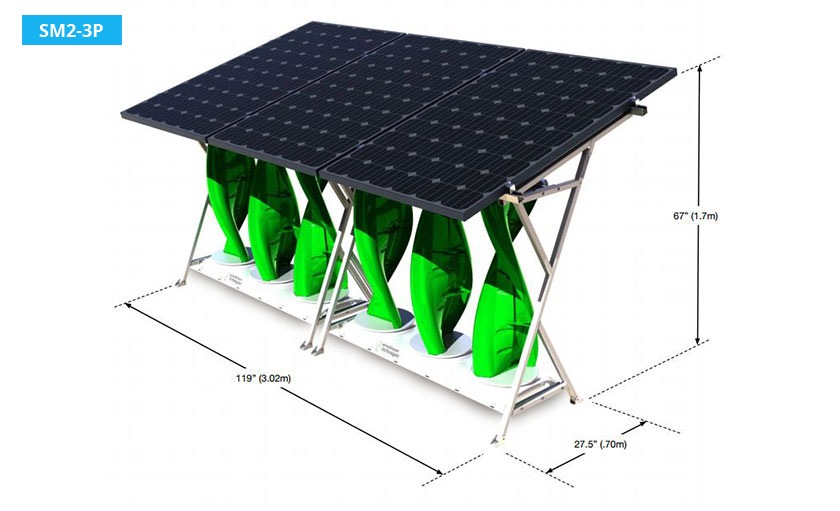 |
|
Windstream Technologies SM2-3P Solar Mill. (Photo courtesy of Windstream Technology) |
Innovative solar farm products
Aside from solar rooftop panels, a couple of companies including von Haartman’s company, Blue Connection, which is a distributor for Windstream Technologies in Thailand, and Japanese manufacturer Masamitsu were displaying solar farm solution products.
Windstream Technologies hybrid solar panel, Solar Mill, was showcased by Blue Connection, and was one of the more innovative solar products seen at the show. The solar panel which comes with vertical axis wind turbines does not need to be situated towards the wind, while the polycrystalline solar panel has about 16% to 20% energy conversion efficiency, said von Heartman.
The hybrid solar panels can be seen along the highways in Argentina, but have not taken off in Thailand yet. Currently, the company is targeting off-grid solar systems and applications for factories and villages. According to von Heartman, the company was approached by an interested starch manufacturer at the show to help its factory generate electricity to lower energy bills. Still, the scalable hybrid solar panels are being retailed at a costly price of 60 million Thai baht (US $16.76 million), depending on the project.
Japanese solar panel manufacturer Masamitsu comes across as an interesting case. Last year the Japanese company attended the show featuring redesigned LED drivers and induction lamps at its booth, but all its lighting products have disappeared from its booth this year. Instead it showcased solar farm solutions.
“We dropped our LED driver and induction lamp business in Thailand because we could not find a suitable partner, who shared the same values as us,” said Robert Hung, General Manager of Matsumitsu Taiwan. Fierce price competitions in the LED market were another reason why the Japanese company has decided to focus on its more profitable solar panel business, where it found considerable success in Japan’s large solar farm projects.
“We are targeting the 1MW to 5MW and above power solar farm projects in Thailand,” said Hung. The company is even considering 10MW projects, which it hopes power companies and government agencies in Thailand will show interest in. The company’s solar panel systems can be very high, which private companies might find unaffordable.
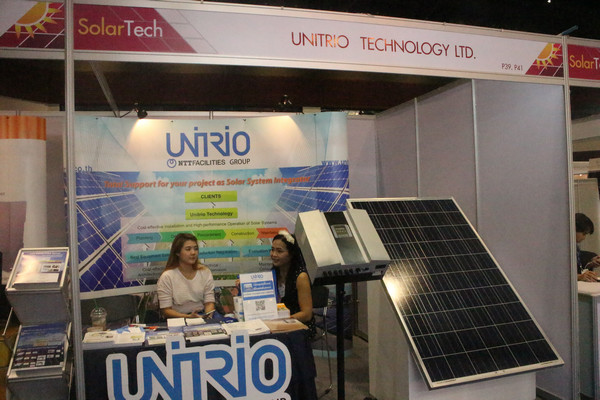 |
|
Unitrio's booth displayed its solar panel products. |
Other solar and energy solutions
Aside from solar panels, Kako and Seiko were displaying energy management solutions, while Japanese telecommunication company NEC was displaying a unique mobile solar panel inspection product. The company which is diversifying its revenue’s new product is capable of scanning for defects through a few selected points on a panel. NEC hoped to be able to retail its mobile solar panel inspection system in Thailand for at least 70,000 Thai baht.
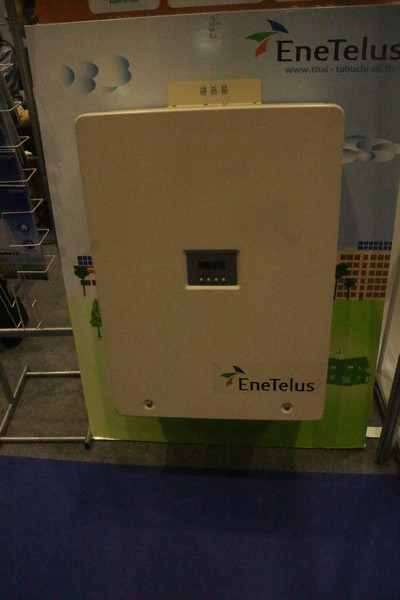 |
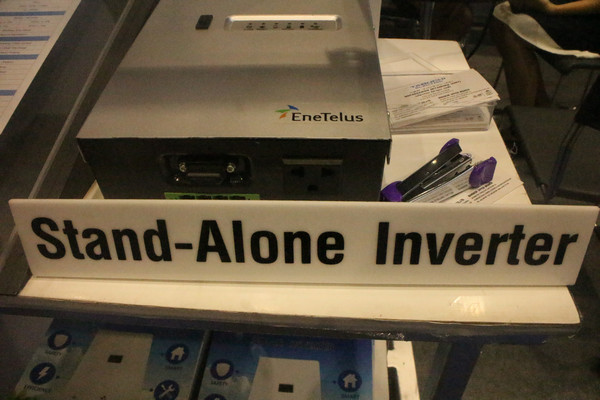 |
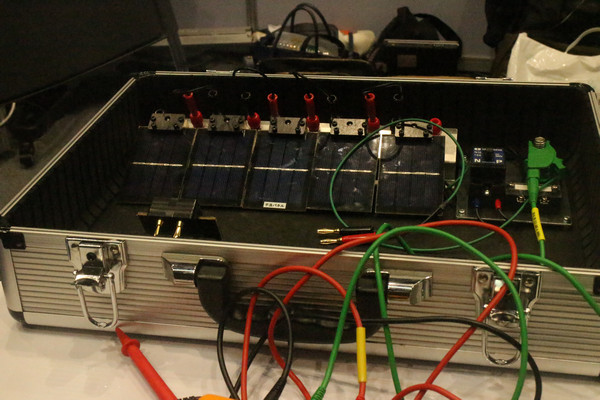 |
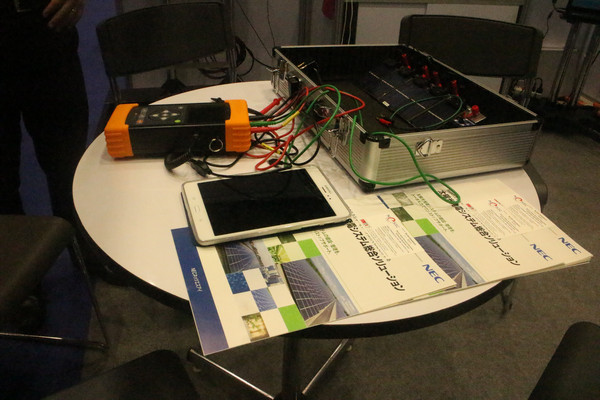 |
|
Top two photos: Enetelus solar inverter and other products. Bottom two photos: NEC's mobile solar panel inspection solution. |
The Thai solar market is blooming and attracting many foreign companies to grab market share, but manufacturers also need to tread with caution in the next few years. Once the government subsidies are removed, it is hard to say whether the market will crash. For the time being, though, the solar market in Thailand presents opportunities for risk-taking solar manufacturers.
(Author: Judy Lin, Chief Editor, LEDinside)





















